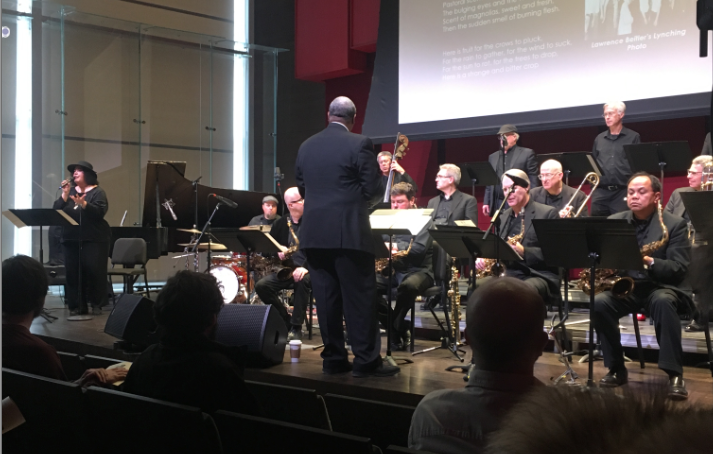‘Jazz in the Fight for Civil Rights’ discussed the music genre’s role in activism
Jazz music, rooted in African-American culture, has captured the history through the civil rights movement.
Haase Findlay and the Turner Center Jazz Orchestra perform at Damani Phillips’ program Jazz in the Fight for Civil Rights on Saturday, Feb. 9.
February 11, 2019
“Southern trees bear strange fruit
“Blood on the leaves and blood at the root
“Black bodies swinging in the Southern breeze
“Strange fruit hanging from the poplar trees”
Tina Haase Findlay sang the lyrics to a song Billie Holiday put her stamp on, “Strange Fruit,” during UI Associate Professor Damani Phillips’ program “Jazz in the Fight for Civil Rights,” which took place Feb. 9.
Haase Findlay’s heart-wrenching song was accompanied by a lynching photo, taken in black and white, depicting two young black men hanging from a tree with white onlookers staring up at them. The song ended, Findlay lowered her microphone, and the audience erupted in applause. Phillips, an associate professor of Jazz and African-American Studies at the University of Iowa, began to speak.
“Black American music has been an accompaniment to the struggle that African Americans have faced in American history,” Phillips said. “It has served as an unofficial anthem for the movement for equality, and the African American condition in this country. [Jazz is a] direct reflection of the life, cultural cues, tastes, and attributions of African Americans. Jazz and black culture share a relationship … it is difficult to imagine either existing as they are today without the other.”
Haase Findlay and the Turner Center Jazz Orchestra punctuated the lecture by performing famous jazz pieces including “Strange Fruit,” “Black, Brown, and Beige Suite,” “Fables of Faubus,” “Mississippi Goddamn,” and “Alabama.”
Phillips’ goal with his presentation is to remind the younger generation to never forget the horrific events that accompany African American history and to show how jazz has helped, and continues to help, the fight for civil rights.
“The fact remains that jazz would not and could not exist without the turbulent relationships African Americans had to overcome,” Phillips said. “[It was born from a] need for black culture to escape the circumstances from which it existed, the deep-seated desire for black culture to be seen as an artistic and intellectual contributor to society.”
Phillips noted that African Americans used music in hopes of being seen as equal, intelligent people who possessed artistic imagery and musical substance. One of the most touching pieces, “Strange Fruit,” was popularized by the famous artist Billie Holiday.
RELATED: A brief history of jazz in Iowa
“ ‘Strange Fruit’ was the first jazz song that speaks openly about civil rights,” Phillips said. “Specifically, [it was used] as a protest of lynchings. Billie Holiday recorded the song in 1939. Singing it made her fearful about retaliation, but she continued to sing the piece because the imagery reminded her of her father.”
He noted that when Holiday performed it, there were strict rules she followed. It had to be the last song in her set, the room had to be in complete darkness, and there was no encore.
For another piece, “Fables of Faubus,” Phillips stepped away from the podium and joined the jazz orchestra, his deep voice pushing against the dark red walls of the auditorium as it crescendoed and cried out with the brass. The audience rocked and clapped, mesmerized, as Phillips picked up a black and gold saxophone and performed a powerful solo that trilled and flowed between and above the other instruments.
The most important takeaway he said he hoped to give his listeners was the awareness that music and culture are heavily a part of each other.
“There are basic events in American history that young people just don’t know. I teach classes in black culture and black music, and folks have no idea about these events that occurred,” Phillips said. “A lot of this is very common sense and awareness. It is designed that way on purpose, it is meant to be accessible. Instead of having to deal with the reality, people act like it doesn’t exist. [Racism] is not an isolated recent incident; this has carried on for hundreds of years.”
Phillips calls on the younger generation to step up and face the problems.
“Until we look reality in its face, how can we know where to go next?” he said, addressing the younger members of the crowd. “Open your eyes. Get away from the micro, and look at the macro. If we want to understand our place in this world and country, we have to understand our context, in 2019.”



